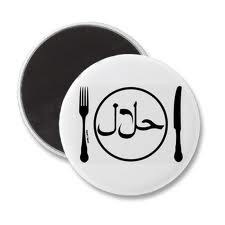 We’ve all heard of Hollywood and Bollywood. Some of you may have even heard of Lollywood (the Pakistani version) and Nollywood (the Nigerian version). But what about Halalywood? No? Well, as of 2014, you probably will. American actor and comedian Omar Regan, who has appeared in films such as Rush Hour 2, has set out to create a halal-certified film industry for Muslims.
We’ve all heard of Hollywood and Bollywood. Some of you may have even heard of Lollywood (the Pakistani version) and Nollywood (the Nigerian version). But what about Halalywood? No? Well, as of 2014, you probably will. American actor and comedian Omar Regan, who has appeared in films such as Rush Hour 2, has set out to create a halal-certified film industry for Muslims.“There are 1 billion Muslims around the world and there is nobody catering for us and our stories. So I left Hollywood and I’m going Halalywood!” Regan says in a video encouraging people to donate to his Kickstarter project.
“Here is our mission: we are going to provide halal entertainment, that’s entertainment we [Muslims] can relate to. Secondly, we want to re-educate the masses about Muslims and Islam. Thirdly, it will provide a platform for young Muslim writers, actors and directors, where they can go and get their stories made and they won’t be turned away,” he says.
Regan is set to release his first movie American Sharia, a comedy/action film about rogue government officials using Islamophobia to maintain power, later this year. However, the up and coming Islamic Film Industry is just one of the many new and emerging scenes being created.
Reacting to the world they see around them, a new generation of young, modern Muslims are carving out new ways to entertain themselves – yet remain loyal to their faith. This new generation is showing that Islam and entertainment can go hand in hand. Along the way, they are shattering stereotypes about what it means to be Muslim in today’s world.
Of course, many of these emerging subcultures have been criticised by conservative Muslims as “unIslamic” for swerving away from traditional and accepted forms of entertainment. One such example is the Islamic Music Industry: launched ten years ago and although growing in approval by many Muslims, it is still attacked because of the use of musical instruments, which some see as haram.
Awakening Records, a UK-based publishing house and record label founded in 2000, saw that Muslims were craving an alternative to the mainstream music industry. Instead of the sexually explicit, violent and misogynistic lyrics in many mainstream songs, Awakening decided to provide a modern, faith-driven alternative.
Their first signing was the British-Azeri singer Sami Yusuf, who in 2003 shot to stardom with his debut album Al Mu’allim. Yusuf’s success was so extraordinary and sudden, it caught Awakening by surprise – he was soon labelled “Islam’s biggest rockstar” by Time magazine in 2006.
But after a famous fallout with Awakening in 2008, Yusuf, 33, later left the record label. Today, he is still among the most popular Islamic musicians in the world as he continues to produce Muslim-friendly music. Yusuf’s departure, however, gave rise to another star. Maher Zain, 32, coming from the mainstream music scene and working with the likes of Lady Gaga, had a change of heart in 2007. He fully embraced his Islamic faith and soon signed to Awakening.
Today, with two multi-platinum albums under his belt, along with Yusuf he has catapulted Islamic music into millions of Muslim houses worldwide.
As Islamic music continues to grow, it is slowly being introduced to non-Muslims, too. Yusuf has self-coined a genre called Spiritique, which he says is more spiritual than religious and hopes for it to transcend race and religion. Similarly, Saif Adam, an increasingly popular UK-born Muslim artist, aims to produce music for Muslims and non-Muslims alike.
Many Muslims are also flocking to music that is often termed “conscious hip-hop”, or political hip-hop. While this type of music is not Islamic per se, the fight against oppression and the promotion of social justice is at its core. This genre is also used as a medium to support and bring attention to certain causes, whether Palestine or Syria. This, again, is seen as a better alternative to “the mainstream”.
Comedy, like music, also has the ability to transcend religion. In the US, the American-Palestinian Muslim comedian Yousef Erakat, who launched the YouTube channel FouseyTube in 2011, has well over 150 million views for his comedy sketches. His videos range from light-hearted religious content such as funny things Muslims do while praying, to playing pranks on the public, to tackling serious social issues like homelessness and bullying.
Meanwhile in the UK, 28-year-old Humza Arshad’s YouTube series Diary of a Badman, which began in 2010, has also made him into something of an Internet celebrity. Arshad’s videos satirise British Asian culture by chronicling a fictionalised version of himself and his relationships with friends and family.
However, one of the most interesting subcultures to have emerged recently is the makeup and hijab fashionista trend. A cursory glance on YouTube typing in the words “hijab tutorial” will expose a whole new world where many young Muslim women will go to learn how to wear different styles of hijabs, apply make up and wear fashion accessories. One of the most popular names in this scene is YazTheSpaz – a hijab, fashion and makeup stylist – who is also set to appear in American Sharia.
Last year, we also saw female Islamic fashion reach new heights – whether it was the Indonesia Islamic Fashion Fair or the Hijab Fashion Week in London. While this April, Aquila Style will host the Pearl Daisy Asia Tour 2014, which will celebrate the best in fashion and arts.
And who could forget Mipsterz? The video, released late last year to a barrage of controversy, showed a group of young Muslim women on skateboards, in high heels, wearing the hijab to the beat of Jay Z’s Somewhere in America. However, not all the feedback was negative. Noor, one of the women featured in the video, said she received positive feedback from people who once thought the hijab was “oppressive” and “disempowering”.
But what are behind these trends? And why are Muslims now reasserting their faith in new, innovative and creative ways?
The obvious is the advent and widespread use of social media, which has made these forms of entertainment possible. Then there’s 9/11 and the constant media coverage that ensued – impacting the way Muslims are perceived and perceive themselves. Many young Muslims across the world, growing up in a profoundly different time to their parents, are interpreting and exerting their religion in new ways. This perhaps explains why it’s young Muslims who are spearheading most of these trends. You could even say a young Muslim revolt is taking shape.
As many societies seemingly turn away from religious values, Muslims are doing all they can to provide their co-religionists with their own niche – one that is cool, modern and, for the most part, Islam-friendly. (aquila-style.com)



